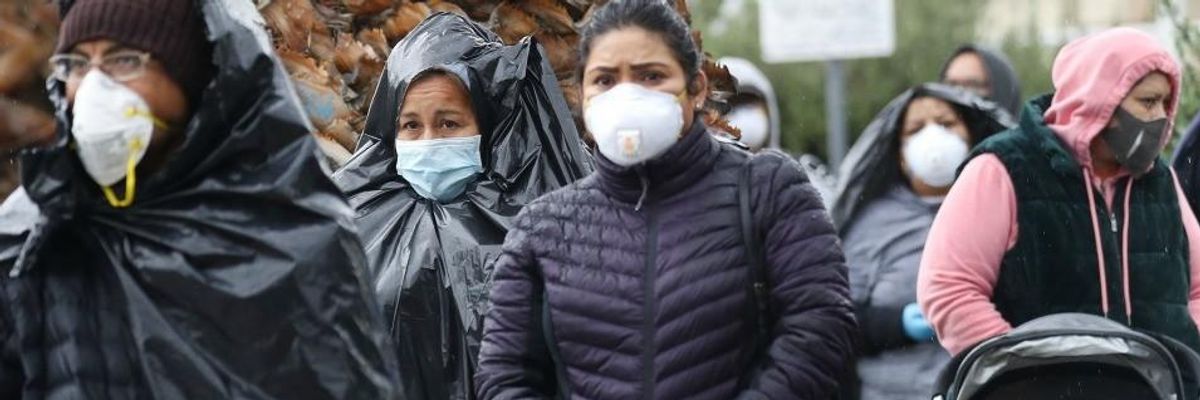As wide swaths of Americans continue to deal with economic damage from the coronavirus pandemic, federal data released Monday belie the nation's growing wealth divide.
The Federal Reserve figures show that household net worth went up 6.83 percent in the second quarter, reaching nearly $119 trillion.
The data also reflected a "rebound in stocks and housing," but, as Bloomberg reported, "[s]ome 45% of the U.S. population doesn't own equities, according to a Gallup survey from June 2020, and about one-third of households don't own a home."
Recent polling sheds more light on Americans' pandemic-triggered economic hardship. According to (pdf) a survey released this month from NPR, the Robert Wood Johnson Foundation, and the Harvard T.H. Chan School of Public Health, more than half of households in the nation's four biggest cities--Chicago, Houston, Los Angeles, and New York City--reported facing serious financial problems during the public health crisis.
Robert J. Blendon, a poll co-director and executive director of the Harvard Opinion Research Program at the Harvard Chan School, warned that "it's going to get worse because there is nothing for the people we surveyed who earn under $100,000 a year to fall back on."
What little economic lifeline some households have been relying on could soon end. As Heidi Shierholz, senior economist and director of policy at Economic Policy Institute, wrote Thursday:
Another 1.5 million people applied for unemployment insurance (UI) benefits last week. That includes 860,000 people who applied for regular state UI and 659,000 who applied for Pandemic Unemployment Assistance (PUA). PUA is the federal program for workers who are not eligible for regular unemployment insurance, like gig workers. It provides up to 39 weeks of benefits, but it is set to expire at the end of this year.
Last week was the 26th week in a row total initial claims were far greater than the worst week of the Great Recession.
For millions of Americans, those job losses have also come with the loss of their employer-tied health insurance, which in turn can bring the burden of medical debt. USA Today reported last week:
In August, consumer finance company Credit Karma conducted an analysis of nearly 20 million members in the U.S. and found that they have a total of $45 billion of medical debt in collections, which averages to about $2,200 of debt per member.
Medical debt has been growing further during the pandemic, rising 7% from the end of last year and just over 3% from when the pandemic started, Credit Karma says. Experts expect it to continue to rise in the coming months since there's a 180-day lag before unpaid medical debts can show up on consumers' credit reports, according to Colleen McCreary, chief people officer at Credit Karma.
"This is a lot of money when you consider nearly half of Americans don't have $400 saved in case of an emergency," says McCreary. "What's worse, this number is expected to rise in the coming months as Americans begin sorting out their finances in the aftermath of the pandemic."
The nation's billionaires, meanwhile, have been enjoying fatter pockets over the past six months. An analysis released last week by Americans for Tax Fairness and the Institute for Policy Studies (IPS) showed that 643 billionaires saw their wealth surge $845 billion, or 29%, since the Covid-19 crisis began six months age.
Meanwhile, the possibility of another round of aid to help Americans buffer the economic hardships is unlikely to come soon, as Congressional leaders have yet to authorize, much less agree on, another round of stimulus payments.
Chuck Collins, director of IPS's Program on Inequality and co-author of the "Billionaire Bonanza 2020" report, put the blame for the massive wealth accumulation alongside record job losses at the feet of federal lawmakers.
"The billionaire economy has been turbocharged by policymakers who are now stalling on relief for the real economy," Collins said last week.
"The difference is stark between profits for billionaires and the widespread economic misery in our nation," he continued. "Clearly, the priorities of our elected officials in Washington, D.C. are completely upside down."




